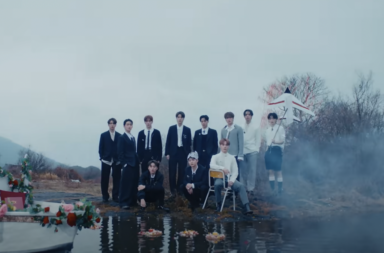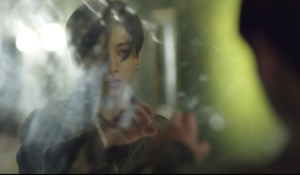
Who am I? — that’s one of life’s simplest yet most complex questions. As humans, it’s only natural that we’re on a never-ending journey to find out who we are. The same is true for K-pop idols. While they are highly idolised by many, they, too, are like us.
On the surface, K-pop is most known for its preppy, bright, and addictive ear-worms. It is rarely associated with abstract issues like self-identity. In fact, K-pop and self-identity just seem like lines that will never meet. Yet, for this group of teens and young adults who are trying to find themselves in this world, the lines of K-pop and self-identity intersect more often than we think. As a universal question, many can never perfectly wrap their heads around it. To be able to even answer “Who am I?” connotes a great sense of self, often almost comparable to attaining the key to life.
Throughout the years of K-pop, there has never been a shortage of love songs. Love is an evergreen topic in music and art. Young love, eternal love, unrequited love, obsessive love. You name it, there’s probably a song about it. But in recent years, K-pop finds itself seeking comfort in openly digging into more introspective issues like self-identity. As matters that don’t exist in a vacuum, K-pop also touches on similar topics like identity crisis, self-acceptance and self-reflection. For one, the “self” in “self-identity” connotes inward-looking, giving songs about self-identity an autobiographical quality. It is raw, personal, relatable, and vulnerable, contrary to the sterile image that idols are expected to have.
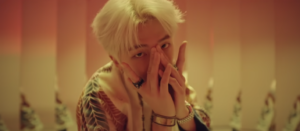
A major part of self-identity is self-reflection. And in K-pop, self-identity is often visually presented through the use of mirrors. Mirrors are a tool for self-reflection, one that lets us acknowledge aspects of ourselves that would otherwise be hidden. In our lifetime, we will never see our faces and how we appear to others will only ever be known through reflections and photographs.
Right off the bat, BTS comes to mind when I think of self-identity in K-pop. While this topic is not new, arguably, BTS popularised the use of it as a concept. RM, in particular, executes this perfectly in “Persona”. Borrowing Murray Stein’s Map of the Soul – Persona: Our Many Face, RM (an abbreviation of “real me”) explores the many facets of his self-identity to find the real him. This aspect is most prominent in the last verse of the MV with the many metallic copies of RM, all dressed in a similar handsome suit as him. In this scene specifically, he acknowledges the multiplicity of faces (or personas) he puts on both in the public, in private, and for himself:
The ‘me’ that I want myself to be
The ‘me’ that people want me to be
The ‘me’ that you love
And the ‘me’ that I create
The ‘me’ that’s smiling
The me that’s sometimes in tears
Though RM lacks a firm sense of self, he is self-aware enough to ask himself “once again” the age-old question of “Who the hell am I?”. Of course, it is not only RM who is confused about his identity. As rational beings who spend the majority of our time in our heads, we find ourselves behaving varyingly in different situations. And that itself can be confusing.
So I’m askin’ once again yeah
Who the hell am I?
Tell me all your names baby
Do you wanna die?
Oh do you wanna go?
Do you wanna fly?
Where’s your soul? Where’s your dream?
Do you think you’re alive?
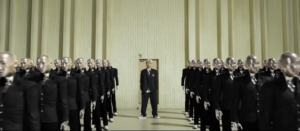
An extremely well thought out verse in “Persona” is when RM speaks to himself in the third person. This act mimics talking to oneself in the mirror, as RM is also seen in a room with actual mirrors. Throughout the MV, only RM appears. There are no backup dancers, no traces of the other members, nothing else.
Instead, we have an army of metallic RMs, a huge RM, and of course, the real RM. At one point, even without a mirror, RM raps to a giant replica of himself. Here, RM addresses his other personas objectively, from a distance, for the betterment of himself. Likewise, his rapid shift in personas throughout reveals how unconscious we are of this change. And the only way to tackle it is just as RM does, that is, to confront your personas through self-talk.
Dear myself
You must never lose your temperature
Cuz you don’t need to be neither warm nor cold
Similarly, Day6 take on a similar function in “For Me”. Speaking of a certain “you”, the song is initially illusive, as if talking to someone else. But with the mention of a mirror, listeners soon realise that Day6 are talking to themselves in an attempt to understand the self. As Young K reveals in an interview: “’Who are you? I want to get to know you.’ But actually, it’s to the person standing in the mirror. From now on, I’m going to get to know you. I’m going to try harder to be closer to you, even though I’ve been next to you longer than anyone in this life”. It is almost as if Day6 are speaking to two different people by detaching the bodily self and the reflected self.
I want to know you
Not anyone else but you
Trapped in the mirror
My face is about to cry
In their interview, Day6 also explains that they believe that “to start a healthy relationship with somebody else we feel like we need to know who you are first”. Again, introspection and self-identity are key here. Day6 cleverly interlinks self-identity and self-love by bringing out the unfamiliarity one can experience when looking at the mirror.
The “you” reflected in the mirror is exhausted and worries the physical persona looking at him. It appears as if the persona fails to recognise himself anymore with how much he has neglected himself over the years. As depressing as that sounds, at the same time, “For Me” sends a heartwarming reminder that we should treat ourselves like how we would treat a close friend.
I wanna thank you
Not collapsing out of exhaustion
Pull me up together with me
Wrapping it up neatly, the most memorable lines in “For Me” are these two lines that properly encapsulate self-love. Sungjin first sings of how he will start to “love you”, as in his reflection, symbolic of his external self and what he shows to the world.
While he identifies with that image, it is to some degree, a false self (though there is nothing wrong about it). In the next line, he consciously realises that from now on, he should start loving the real him and not his reflection. Most importantly, the critical use of “I mean” serves as a conscious correction of Sungjin’s past unconscious thoughts of loving someone else before himself. The power of these mere two words reveals the true extent of their self-acceptance.
I will start to love you
I mean I will love me now
Tying self-identity with K-pop’s most loved subject, love, BTS’ “Fake Love” and The Boyz’s “Salty” exhibit the interplay between being too caught up in love and the loss of self-identity. In “Fake Love”, simply put, experiencing ingenuine love has destroyed them as they have given their all to their now ex-lover. The world suddenly seems so bleak now that the love they once thought was genuine, is in fact, not. As much as their lover has been untruthful to them, they realise that they have also been untruthful to themselves. In turn, they lose themselves in this now hopeless world of deceit.
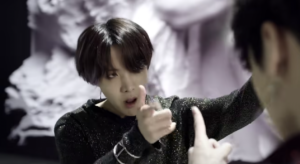
Coupled with J-hope and Jimin’s part of the choreography (where Jimin is J-hope’s reflection), J-hope asks himself in third person, “Try babbling into the mirror, who the hell are you?”.
Following a terrible breakup, he has suddenly lost his sense of self. Clearly, J-hope is upset. And of course, babbling does not make sense. Yet, what appears to be “baby talk” is far from that. J-hope babbles to release his repressed emotions, a sign of catharsis due to what seems to be emotional trauma. He also babbles as he lacks confidence even if he is talking to himself. The act of looking into the mirror and talking to oneself points at his lack of self-consciousness from channelling all his energy towards his ex-lover. But in doing so, he is slowly realising his true identity beyond the title of a “lover”.
I wanna be a good man, just for you
I gave the world, just for you
I changed everything, just for you
But I don’t know me, who are you?
The forest just for us, you weren’t there
The route I took, I forgot
I even became quite unsure of who I was
Try babbling into the mirror, who the hell are you?
The Boyz’s “Salty” echoes a similar story. The Boyz battle with finding themselves after experiencing more salty than sweet moments in their relationship. The bittersweet moments (or rather, salty-sweet moments) leave a bad taste in their mouths as they grow aware of the warning signs. Previously blinded by these red flags, talking to themselves in the mirror grants them clarity. In doing so, they later confess that they are sorry that the relationship is coming to an end and ends it off confidently.
Likewise, “Salty” begins on a sombre note but slowly picks up to become more cheery. Like “Fake Love”, Juyeon and Younghoon also mirror each other’s movements as part of the choreography. Moreover, while the relationship has yet to end, Younghoon is already imagining “as if [love] had already left my hands”. Though physically in the present, his simple act of glancing at the mirror grants the mirror its introspective and visionary quality.
Who am I?
Trying to talk to myself in the mirror
As if it had already left my hands
Do or Die
Warning sign that penetrates my heart like a thorn
The ongoing recurrence of self-identity in K-pop proves that idols are moving towards showing their vulnerable sides to us. Self-produced or not, they bare it all in their truthful songs about the self. Songs touching on self-identity allow fans a sneak peek into their inner struggles behind the glitz and glamour. Whether it is discovering the self or rediscovering the self, “Who am I?” will always be an existential question both in the real world and in K-pop.
(Billboard. YouTube[1][2]. Images via Cre.ker Entertainment, HYBE Entertainment, JYP Entertainment. Lyrics via Genius, Genius, lyricskpop, Lyrics Translate.)


